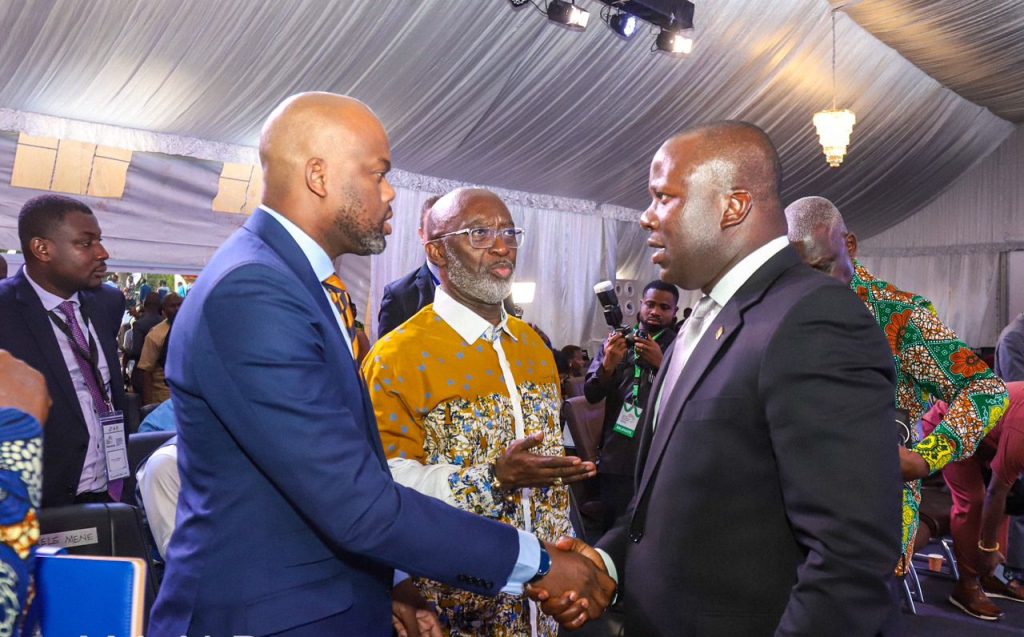By Godwill Arthur-Mensah
Adukrom (E/R), Jan. 28, GNA–The Caretaker Minister of Trade and Industry, Samuel Abu Jinapor, has called on African ministers, and regional economic communities to work closely with the private sector to constitute the requisite institutional and logistical frameworks for continental trade to thrive.
He said the private sector had always been the backbone of the African economy, which constituted the primary driver of the African Continental Free Trade Area (AfCFTA), therefore, the success of the continental single market depended largely on empowering the private sector to grow.
“We have a unique opportunity through AfCFTA, to develop our continent, with 54 countries strategically combining our forces in trade and business, to create a single continental market, Africa is undoubtedly, ready to emerge as a leader in the global trade market,” Mr Jinapor stated.
Mr Jinapor made the call at the closing ceremony of a two-day Business and Policy Leaders’ Dialogue of the Africa Prosperity Dialogues held at the Safari Valley Resort, Adukrom, Eastern Region on Friday.
It was organised by the Government of Ghana, through the Ghana Investment Promotion Centre (GIPC), in collaboration with the African Continental Free Trade Area Secretariat, Africa Prosperity Network and Economic Commission for Africa.
The dialogue was aimed at proffering actionable solutions to boost intra-African trade and ensuring Africa’s prosperity within the context of the Africa Union’s Agenda 2063 for economic transformation.
It was held on the theme, “AfCFTA-From Ambition to Action: Delivering Prosperity through Continental Trade”.
Some key stakeholders in attendance include government representatives across the continent, business leaders, policymakers, heads of Africa Investment Promotion Agencies, academia and the diplomatic community as well as key stakeholders in Africa and international partners.

The Caretaker Trade minister was of the view that through public-private and multi-sectorial engagements, Africa could unblock the bottlenecks that hamper the full realisation of its single market agenda.
“I, therefore, respectfully, call on all of us, gathered here, Ministers, policymakers, government representatives, and representatives of regional economic communities, to work with the private sector to institute the requisite institutional and logistical frameworks for the private sector to thrive,” he said.
“There is no gainsaying that the private sector, which has always been the backbone of the African economy, constitutes the primary driver of the AfCFTA, and the success of this single market depends, largely, on how this sector is empowered and resourced to engage in meaningful trade across the continental market,” Mr Jinapor stressed.
“While targeting the private sector, we must drill down further to address the needs of micro, small, and medium-sized enterprises in our respective countries, as they contribute more than half of the continent’s gross domestic product (GDP),”he said.
The International Finance Corporation (IFC) estimates that micro, small, and medium-sized enterprises (MSMEs) account for some 90 per cent of all businesses in Africa and provide some 80 percent of jobs across the continent.
The Caretaker Trade minister, thus, urged the private sector stakeholders to own the AfCFTA, and continue to work with African governments to ensure its full implementation.
“For not only will the private sector be the driving force of AfCFTA, but it will also be the primary beneficiary of the single market when we achieve the desired levels of trade between ourselves as a people,” Mr Jinapor stated.
Mr Jinapor noted that the advancement of intra-continental trade would allow private businesses to expand their markets, and venture into new territories which were previously inaccessible to them.
“Africa can and will unleash prosperity for its peoples. The Europeans did it, at least beginning from the Industrial Revolution of the eighteenth and nineteenth Centuries, with the mining of coal and the use of steam engines through the development of technology, and the creation of a single market for the movement of goods and people,” the Caretaker Minister pointed out.
“The Asians have done it, with the Asian Miracle of the Four Asian Tigers fuelled by exports and rapid industrialisation”.
“Africa can and must do it. The fundamental question is, what does it take to do this? We, therefore, must:
Firstly, promote a free society, anchored on democratic principles and the rule of law, including an independent judiciary, to adjudicate disputes between the state and private citizens as well as among citizens; for without an independent judiciary, investors will have no confidence to invest in our countries”.
“Secondly, as articulated earlier, we must promote the private sector as the engine of growth. The development of Japan and the Asian Tigers is enough testimony of the centrality of the private sector to unlock prosperity”.
“Thirdly, we need well-educated, competent and capable citizens. Europe and America’s technological revolution is attributed, largely, to skilled and educated workforce. We must, therefore, invest in the education of our citizens”.
Mr Jinapor underscored the need for the promotion of a high sense of consciousness amongst the African youth to be actively involved in every aspect of trading and business activities on the continent.
“Africans are one people. We share a common history and have common values. As early as the eighth century, and, even before then, we traded without borders on the Trans-Saharan corridors,” the Minister recalled.
“The youth of our continent are awake and palpably determined not to settle for less. Whether in Accra, Addis Ababa, Cairo, Bamako, Ouagadougou, Jubah, Soweto or Kinshasa, the consciousness of our young men and women is at an all-time high,” Mr Jinapor stated.
GNA